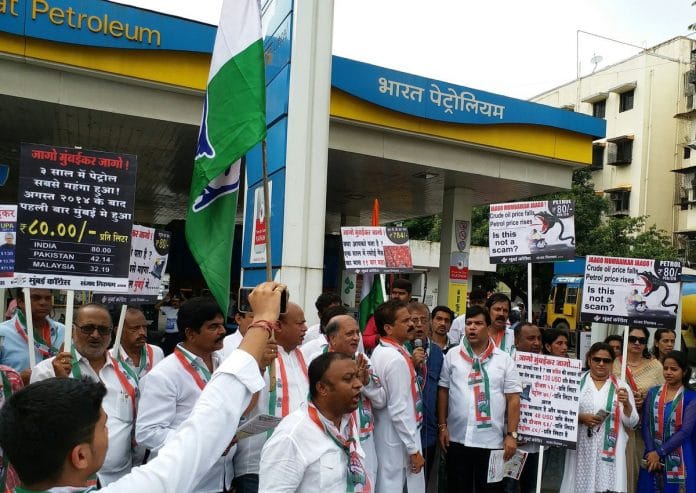The deregulation of fuel prices was meant to make things easier for the aam aadmi, it is instead being used to increase taxation.
The announcement last week of yet another hike in retail prices of petrol and diesel has created strong resentment across the country, with the average Indian citizen frustrated at the all-time high cost of these products. Their anguish has been compounded by the fact that the current upward hike has come on the heels of a consistent fall in the global price of oil over the past three years.
The UPA government had seen the problem in reverse – it came to power in 2004 with oil at $40 a barrel (and the dollar at about ₹45), and faced elections in 2014 with oil at $140 (and the dollar at over ₹60). Unable to absorb the considerable burden on the exchequer of this significant increase, the government passed on some of the cost to the consumer, and paid the price at the hustings.
At the time that Prime Minister Narendra Modi was ushering in his new government in 2014, a barrel of oil was selling internationally at $108.60. As of last week, it had fallen to $54.40 per barrel. Given that India imports the bulk of its oil and gas needs, many voters had hoped that this reduction in global prices by nearly 50 percent would have led to corresponding savings for the common domestic buyer in India. But between 2014-2017, prices in the capital region of New Delhi, for instance, have remained around ₹70-₹73. The rest of the country paints a similar picture – this, at a time when the Rupee to Dollar exchange rate has not fluctuated significantly within this period.
In a country where any increases to the cost of fuel are known to cause mass outrage, it was quite surprising to see that it took so long for public wrath to surface. But now it has.
The NDA government took a decision to switch to a dynamic pricing system for oil and petroleum, accompanied by daily revisions to the Retail Selling Prices (RSP) of petrol and diesel. As a result, while prices increased by a few paise every day, it was less pronounced than during the UPA government, where price revisions were undertaken fortnightly and each announced increase caused a political backlash. This gradual creep of prices lulled the public into adjusting its price-tolerance daily.
It also allowed the government to mask a huge increase in the quantum of excise duty levied by the Centre on these products. In effect, as the world price of oil dropped, the Indian tax increased to make up for it. In the last three years, central tax on petrol has increased 11 times, from 34 percent to 58 percent, and from 21.5 percent to 50 percent on diesel. To offer some perspective, these high taxes have resulted in making automobile fuel in India comparatively more expensive than China, Sri Lanka, Nepal or even Pakistan.
Despite the opposition parties repeatedly raising the issue in Parliament, the government has ducked the issue so far, assuming people would not notice marginal increases in fuel prices. Now it finds itself on the defensive, with one new Union Minister even suggesting that if somebody could afford a bike or a car, then that individual could definitely afford to pay for fuel. This is arguably not the best approach to mollify a simmering country, where the cost of transportation is a major burden for most. Worse, it overlooks the fact that the fuel prices affect those who do not own vehicles too, since it has a ripple effect on every basic item of food, clothing and sustenance transported to markets.
Other ministers have claimed that the revenue generated by these taxes is an integral financier of vital rural development projects and poverty alleviation in India. Portraying taxes that pinch pockets across the board as a pro-people measure may well tax the ingenuity even of the BJP’s notorious spinmeisters.
The sorry saga of fuel prices has become a poster child for this government’s mismanagement of the economy and its inability to improve the life of the aam aadmi. The entire purpose of fuel price deregulation, a decision initiated by the UPA government, was to ensure that the benefits of decreasing oil prices would be passed on to the customer. The BJP government, too clever by half, chose instead to use it as an excuse for a surreptitious increase in taxation. As former Finance Minister P. Chidambaram describes it, they have tried to mine the fuel sector for easy money and substitute excise taxes for the failure of schemes that were supposed to improve India’s taxation health in the first place. The public is waking up to the reality that it has been had.
The surreptitious increase in fuel prices was part of a “frog in the pan” strategy by the BJP government. If you throw a live frog into a pan of boiling water, it will leap out, scalded, and scurry to safety. But if you put a live frog in a pan of tepid water, and gradually turn up the temperature, it will keep adjusting to the increased heat until it is cooked to death. The Indian public is the frog in this story – and it is realizing that it has just enough time to jump out.







BJP WILL PAY HEAVY PRICE FOR THIS BUT CONGRESS WILL NOT BE BENIFITTED FROM THIS SINCE IT IS A OARTY OF ANTI HINDUS. IF WE HAVE TO CHOOSE BETWEEN SURVIVAL& FUEL PRICE Rs 100/ lt WE WILL CHOOSE SURVIVAL & OFCOURSE BJP.